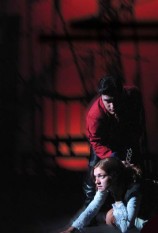
Faith, Violence, and Performance
Fall 2005
Letter From The Editor
Editorial: Holy War Theatres
Mark Pizzato
Abstract:“Every since 9/11…” This notion has come to dominate or current consciousness. Perhaps future historians will call this period not to the postmodern or postmodern, but the “millennial period.” This editorial considers the performative dimensions of war as well as theatre about war, and interrogates the place of faith in violent conflict. But why are ‘religious’ villains so popular in our theatres of war and mass media? Historically, the Western idea of theatre emerged and reemerged through the melodramatic rites of good and evil forces, human and divine, demanding forces. Pizzato emphasizes the tendency of people to gravitate towards evil as an explanation and asks, particularly, what did the performances of 9/11 mean? Has the art of theatre been outmoded not only by cinema and television, but also by the reality show of live terrorist spectacles in the mass media or their threat to strike again, anywhere any time? Sacrifices are made, in all historical periods, to incarnate the others existence. In this way, theatre, from stage to screen, might change the melodramatic “war on terror” toward a tragic realization of American hubris. Conflict has been at the heart of theatre, religion, and human evolution for many millennia. If terrorism is theatre, then there is too much of it in the world today, especially religious, political, and mass-media melodrama.
Feature: Staging Terezfn: A Performance-Based Research Project
Lisa Peschel & Alan Sikes
Feature: “Great mowrning and mone”: Modeled Spectatorship in the Towneley Scourging
David Eshelman
Highlight: Interview with Eve Ensler
Highlight: The Interminable War? Cycles of Violence in Helen Edmundson’s The Clearing
K. Sarah-Jane Murray
Abstract: Reputed British playwright Helen Edmunson’s play The Clearing humanizes a concrete point in the Anglo-Irish conflict: the time is 1653, and the plot is the marriage between an Irish girl and a Cambridge educated English gentleman. Murray’s speech provides an exhaustive analysis of this 1993 John Whiting Award recipient. And the play, “a complex work”, is in its turn a review of the shattering effects of the persecution policy imposed on Ireland in the seventeenth century by Oliver Cromwell’s government. The article comments upon the failed love story between the two protagonists as a background for the clearing of Irishness in Ireland; the opposition between the two sides is initially embodied by the secondary characters. Eventually, the conflict overtakes the lovers, as well. Prof. Murray contextualizes the historical moment the characters are living in by discussing the main points of an almost eight hundred years old confrontation, and sheds light on the relevance that Helen Edmunson’s Clearing has for the present day audience.
Highlight: “The Troubles of Romeo and Juliet”
Crystal Brian
Abstract: The Troubles of Romeo and Juliet was produced by Quinnipiac University and staged at New Haven’s Long Wharf Theatre in April of 2004. Shakespeare’s Romeo and Juliet forms the basis for a collaboratively-conceived piece of theatre examining of the Troubles of Northern Ireland. Students conducted extensive research, focusing on first-hand accounts of those who have suffered during the violence which has torn the tiny country for generations. The result was this script, which seeks to “make strange” that story by emphasizing the violence of angry men and women focused on vengeance and retribution rather than the love story of Romeo and Juliet. The back-stories of Shakespeare’s characters have been revised to include many different perspectives. Mercutio speaks as a member of one of the most violent of the Protestant Loyalist paramilitary groups, the Shankill Butchers; Tybalt becomes a Catholic IRA officer; the Nurse’s fiancée was executed by Loyalists as she watched; Juliet’s friend, a Protestant, was beaten to death by Loyalists who mistook her for a Catholic.
Profile: Elfriede Jelinek
Jennifer L. Good
Book & Performance Reviews:
- Peter Novak- Mary Magdalene and the Drama of Saints, Theresa Coletti
- Heather Beasley-Drama Education in the Lives of Girls: Imagining Possibilities, Kathleen Gallagher
- Christine Boyko-Head-This is My Body: Representational Practices in the Early Middle Ages, Michal Kobialka
- Debra Charlton- “Tamar’s Revenge” at the Royal Shakespeare Company, London, UK
- Steven Pounders-“Marisol” at Risk Theatre Initiative, Dallas, TX
